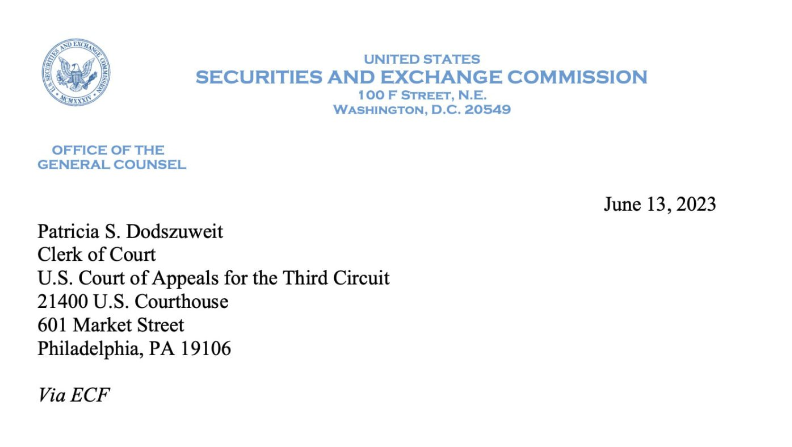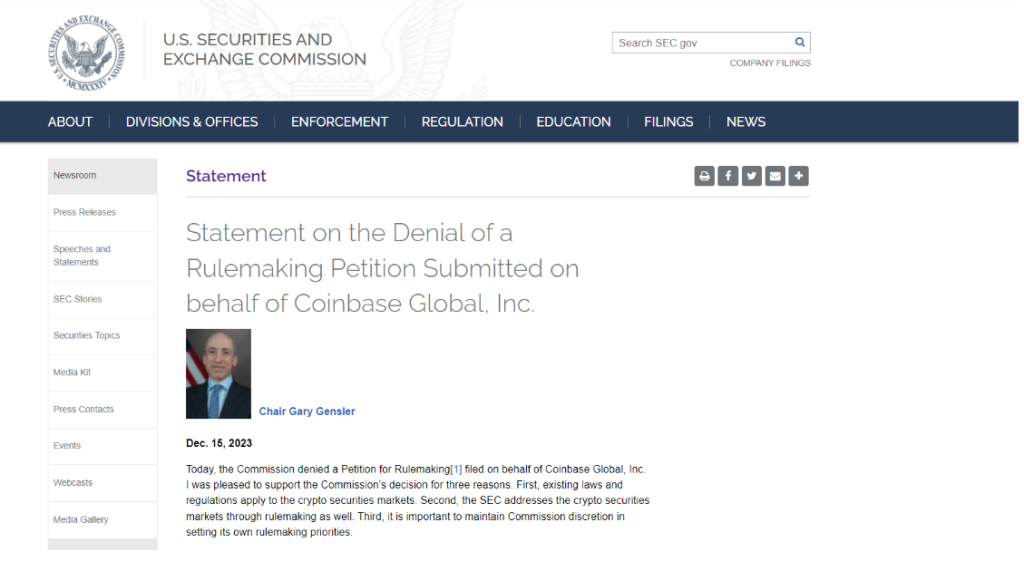In a significant development in the cryptocurrency regulatory landscape, the U.S. Securities and Exchange Commission (SEC) has formally denied Coinbase’s petition to establish separate rules for the crypto market. This decision, communicated by SEC Chairman Gary Gensler, follows months of anticipation and legal maneuvers by Coinbase, reflecting the complex and evolving relationship between regulatory bodies and the burgeoning cryptocurrency industry.
- The Coinbase Petition Saga: A Timeline of Requests and Delays
- Gensler’s Response: Applying Existing Laws to Cryptocurrencies
- Crypto Market Not a Priority: SEC’s Regulatory Focus
- Implications for Coinbase and the Crypto Industry
- User and Investor Confidence: The Ripple Effect
- Looking Ahead: The Evolving Dynamics of Crypto Regulation
- Conclusion: Navigating the Regulatory Maze in Crypto’s Future
The Coinbase Petition Saga: A Timeline of Requests and Delays

Since July 2022, Coinbase has petitioned the SEC to create distinct regulatory frameworks for the crypto market. Despite persistent efforts, the SEC continuously deferred the consideration of Coinbase’s plea. Frustrated by the delays, Coinbase escalated the matter to the courts in June 2023, compelling the SEC to respond.
Gensler’s Response: Applying Existing Laws to Cryptocurrencies

Gary Gensler, the SEC Chairman, has now officially rejected Coinbase’s call for separate rules. In his response, Gensler contends that the existing laws from the Securities Act of 1933 can adequately apply to cryptocurrencies. This assertion suggests that, from the SEC’s perspective, the legal framework established nearly a century ago is sufficiently adaptable to encompass the complexities of the modern crypto landscape.
Crypto Market Not a Priority: SEC’s Regulatory Focus
Gensler’s refusal to carve out separate rules for the crypto market is grounded in the SEC’s perception of priorities. He argues that the SEC is presently engrossed in regulating the $110 trillion capital markets, emphasizing that the crypto market is not a primary focus. This stance raises questions about the SEC’s capacity to balance its regulatory responsibilities across traditional and emerging financial sectors.
Implications for Coinbase and the Crypto Industry
The SEC’s denial has immediate and long-term implications, particularly for Coinbase and the broader cryptocurrency industry. Coinbase, a leading crypto exchange, sought specific rules to navigate the regulatory landscape more transparently. The denial signals that under Gensler’s leadership, the SEC believes the existing legal framework is sufficient for overseeing crypto-related activities.
Challenges for Coinbase Compliance
For Coinbase, operating within the current regulatory framework means navigating an intricate web of rules originally designed for traditional financial instruments. The absence of crypto-specific regulations poses challenges for compliance, reporting, and the overall business strategy of the platform.
Broader Impact on Industry Innovation
The SEC’s refusal may impact the broader crypto industry’s innovation landscape. With tailored regulations, crypto projects and businesses can avoid uncertainty, potentially hindering the development of novel technologies and financial instruments.
Discover more! Unveiling Senator Warren’s Anti-Money Laundering Bill
User and Investor Confidence: The Ripple Effect
Beyond Coinbase and industry innovators, the SEC’s decision has a ripple effect on user and investor confidence. Clarity in regulatory frameworks is often seen as a stabilizing factor, encouraging broader adoption and participation. The need for specific rules for the crypto market might raise concerns among investors and users about the regulatory environment’s consistency and predictability.
Looking Ahead: The Evolving Dynamics of Crypto Regulation
As the SEC’s decision reverberates through the crypto industry, it underscores the evolving dynamics of crypto regulation. The push for clarity and tailored regulations will likely persist as the crypto market matures. Whether regulatory bodies adapt existing laws or develop new frameworks, finding a balance that fosters innovation while ensuring investor protection remains a complex challenge.
Conclusion: Navigating the Regulatory Maze in Crypto’s Future
The SEC’s denial of Coinbase’s plea for separate crypto-specific rules marks a pivotal moment in the regulatory journey of the cryptocurrency industry. As stakeholders absorb the implications, the path forward involves ongoing dialogue between regulatory bodies, industry participants, and policymakers. Balancing innovation and investor protection will define the regulatory maze that the crypto industry navigates in the years to come.

